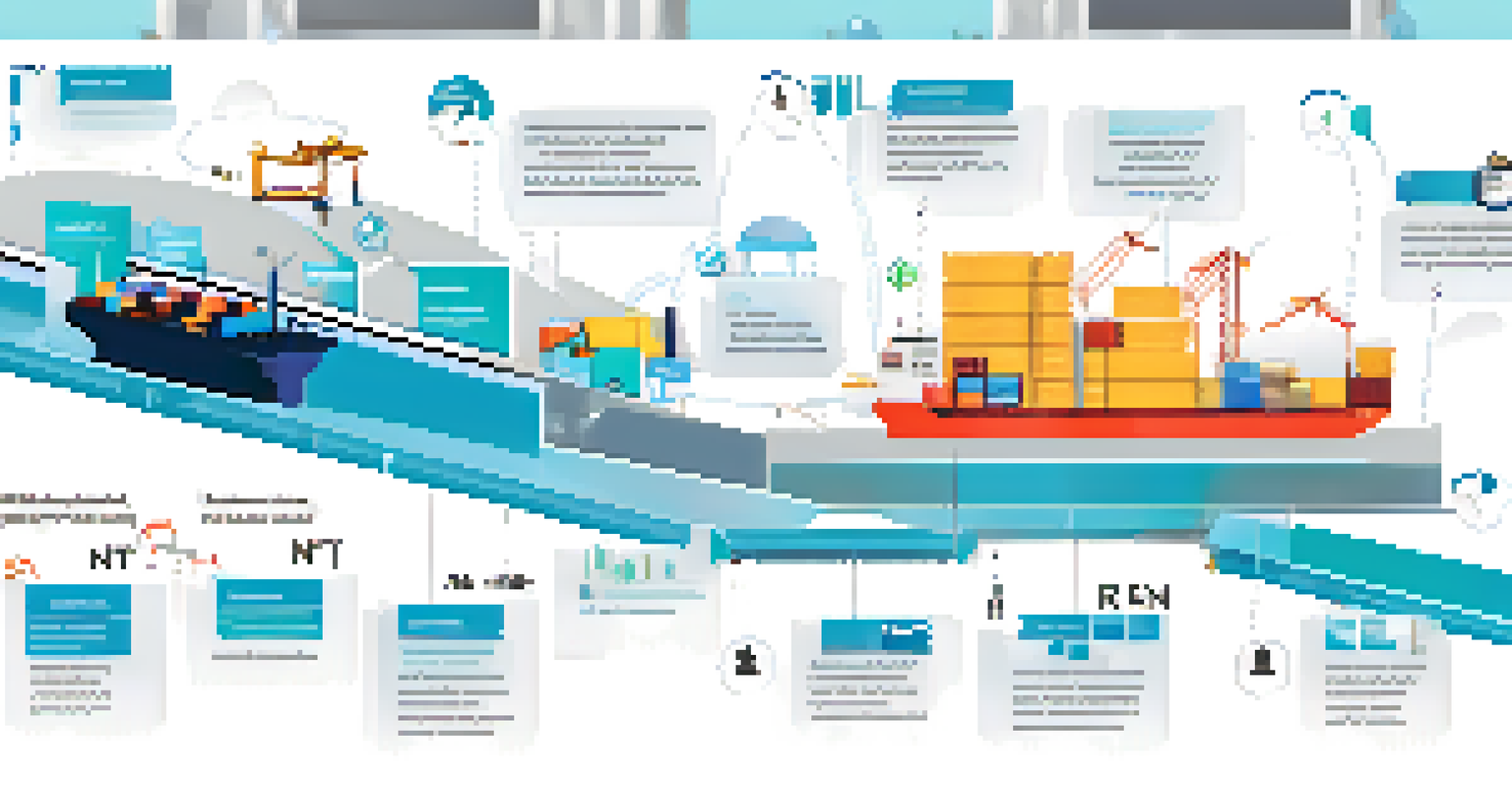Enhancing Supply Chain Efficiency with NFT Technology

Understanding NFTs and Their Role in Supply Chains
NFTs, or Non-Fungible Tokens, are unique digital assets verified using blockchain technology. Unlike cryptocurrencies, which are identical and interchangeable, NFTs represent individual items, making them perfect for tracking one-of-a-kind products in a supply chain. This technology can help businesses prove authenticity and ownership, which is crucial for high-value goods.
The blockchain is the perfect technology for supply chain management because it provides a secure and immutable record of transactions, ensuring transparency and trust among parties.
In supply chains, NFTs can be used to track the journey of products from production to delivery, creating a transparent record that all parties can access. This transparency not only builds trust among stakeholders but also simplifies the auditing process. Imagine being able to trace a luxury handbag back to its original materials, ensuring every component is ethically sourced.
Furthermore, as businesses increasingly focus on sustainability, NFTs can help track the environmental impact of products. By providing a digital record of a product's lifecycle, companies can demonstrate their commitment to eco-friendly practices, appealing to environmentally-conscious consumers.
Streamlining Inventory Management with NFTs
Inventory management can often feel like juggling – one wrong move and everything can come crashing down. NFTs can streamline this process by providing a precise digital representation of each item in stock. With NFTs, businesses can monitor inventory levels in real-time, reducing the chances of overstocking or stockouts.

For instance, a retailer can utilize NFTs to give each product a unique identifier, making it easier to track sales and stock levels across multiple locations. This data can then be leveraged to make informed decisions about restocking and product placement. The result? A more efficient inventory management system that saves time and resources.
NFTs Enhance Supply Chain Transparency
NFTs provide a transparent digital record that tracks products from production to delivery, fostering trust among stakeholders.
Moreover, integrating NFTs into inventory management can help reduce human error. By automating tracking and reporting processes, businesses can focus on strategic growth rather than getting bogged down in manual tasks. This shift allows teams to operate more efficiently, ultimately enhancing overall supply chain performance.
Enhancing Traceability in the Supply Chain with NFTs
Traceability is a cornerstone of effective supply chain management, allowing companies to track products through every stage of production and distribution. NFTs enhance traceability by providing a tamper-proof digital record of each transaction, making it easier to verify the origin and handling of products. This is especially important in industries like food and pharmaceuticals, where safety is paramount.
In the digital age, consumers are demanding more transparency regarding the origin and journey of the products they buy. Blockchain technology, through NFTs, can meet this demand and foster brand loyalty.
For example, if a food product is found to be contaminated, NFTs can help retailers quickly trace the source back to specific farms or processing facilities. This rapid response not only protects consumers but also minimizes the potential financial fallout for companies. A clear record can make all the difference in swiftly addressing and resolving issues.
Additionally, having a transparent traceability system can boost consumer confidence. Shoppers are increasingly interested in knowing where their products come from and how they were made. By utilizing NFTs, companies can share this information easily, enhancing their brand reputation and fostering customer loyalty.
Reducing Fraud and Counterfeiting Risks with NFTs
Fraud and counterfeiting are significant challenges in many supply chains, leading to financial losses and damaged reputations. NFTs can serve as a powerful deterrent against these issues by providing a unique digital signature that verifies a product's authenticity. When customers know they are purchasing a genuine item, they are less likely to fall victim to scams.
For instance, luxury brands are particularly vulnerable to counterfeiting. By issuing NFTs for each product sold, brands can ensure that customers can verify the authenticity of their purchases with a simple scan. This not only protects the brand's image but also enhances the customer experience.
Streamlined Inventory Management
By using NFTs, businesses can better monitor inventory levels in real-time, reducing human error and improving efficiency.
Furthermore, the use of NFTs can simplify the process of returns and exchanges. With a clear digital record of ownership and authenticity, businesses can quickly verify claims and streamline their return processes. This efficiency can lead to increased customer satisfaction and loyalty, ultimately benefiting the bottom line.
Optimizing Logistics and Delivery with NFT Technology
Logistics and delivery are critical components of any supply chain, and inefficiencies in these areas can lead to significant delays and increased costs. NFTs can optimize logistics by providing real-time tracking information for shipments. This level of visibility allows companies to monitor their products' journey and make adjustments as needed.
Imagine a shipping company utilizing NFTs to track the exact location and condition of perishable goods during transit. If a shipment is delayed, the company can proactively inform stakeholders and adjust plans to minimize spoilage. This responsiveness not only improves operational efficiency but also enhances customer trust.
Additionally, the integration of NFTs can facilitate smoother interactions between different parties in the logistics chain. Smart contracts, which are self-executing contracts with the terms directly written into code, can automate processes like payments and delivery confirmations. This can significantly reduce administrative burdens and speed up transaction times.
Leveraging Data Analytics with NFT Integration
Data analytics plays a vital role in modern supply chain management, helping businesses make informed decisions based on trends and patterns. With NFTs, companies can gather a wealth of information about their products and transactions, which can be analyzed for insights. This data-driven approach can lead to improved operational strategies and enhanced customer experiences.
For example, by analyzing NFT transaction data, a company might discover that certain products are more popular in specific regions. Armed with this knowledge, they can tailor their marketing and inventory strategies accordingly, ensuring they meet customer demand. This level of personalization can set a business apart from its competitors.
Boosting Traceability and Trust
NFTs create tamper-proof records that enhance traceability, allowing companies to quickly address issues and build consumer confidence.
Moreover, the aggregation of NFT data can facilitate predictive analytics. By understanding past trends, businesses can forecast future demands and adjust their supply chains proactively. This not only enhances efficiency but also helps in strategic planning and resource allocation.
The Future of Supply Chains with NFT Technology
As we look to the future, the role of NFTs in supply chain management is poised to grow significantly. With advancements in blockchain technology and increasing awareness of its benefits, more businesses are likely to adopt NFTs for their supply chains. This shift could lead to a more transparent, efficient, and trustworthy supply chain ecosystem.
Imagine a world where every product has a digital twin on the blockchain, providing consumers and businesses alike with complete transparency. Such a transformation could redefine customer expectations and elevate industry standards. The potential for innovation is immense, and companies that embrace this technology early on are likely to gain a competitive edge.

However, the integration of NFTs into supply chains will require careful consideration of challenges like technical adoption and regulatory compliance. As businesses navigate these challenges, collaboration and knowledge sharing will be essential. Ultimately, the future of supply chains with NFT technology promises to be an exciting journey toward greater efficiency and accountability.